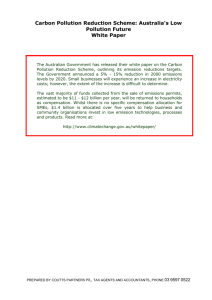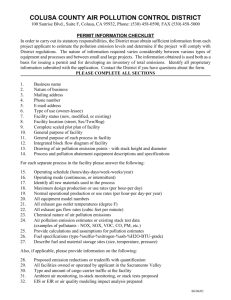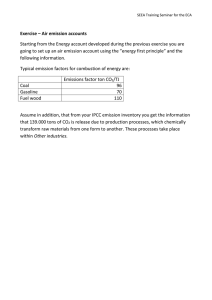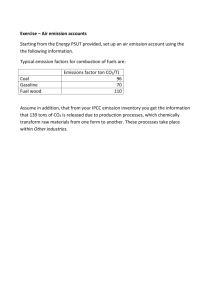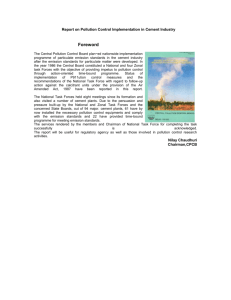3330205 - Gujarat Technological University
advertisement
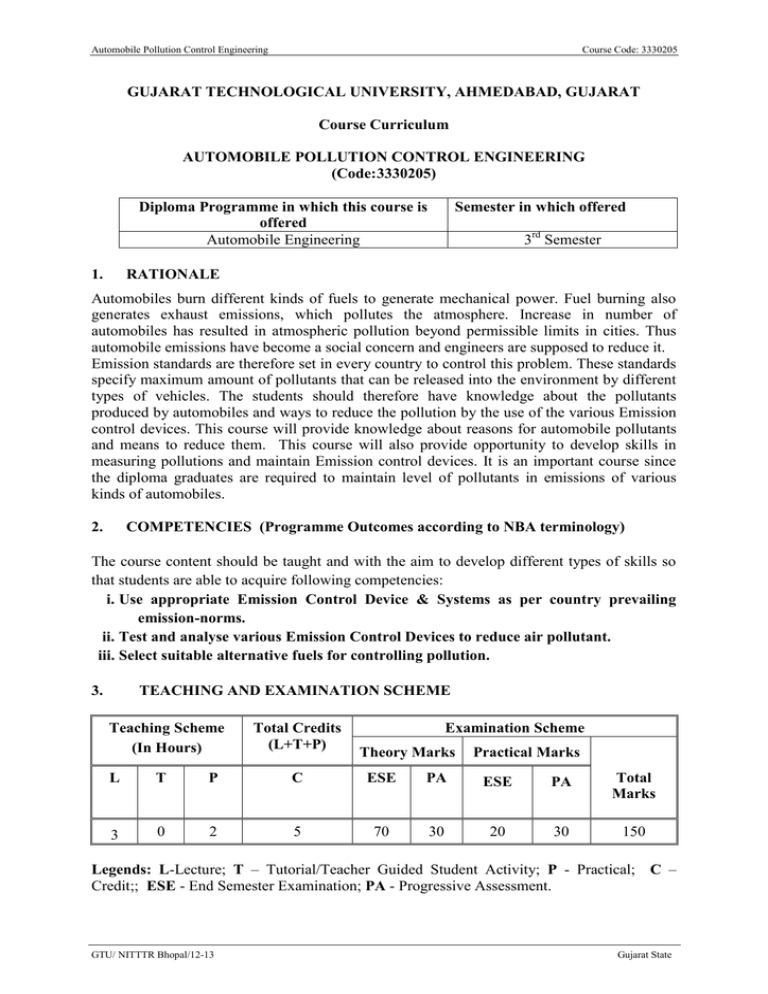
Automobile Pollution Control Engineering Course Code: 3330205 GUJARAT TECHNOLOGICAL UNIVERSITY, AHMEDABAD, GUJARAT Course Curriculum AUTOMOBILE POLLUTION CONTROL ENGINEERING (Code: 3330205) Diploma Programme in which this course is offered Automobile Engineering 1. Semester in which offered 3rd Semester RATIONALE Automobiles burn different kinds of fuels to generate mechanical power. Fuel burning also generates exhaust emissions, which pollutes the atmosphere. Increase in number of automobiles has resulted in atmospheric pollution beyond permissible limits in cities. Thus automobile emissions have become a social concern and engineers are supposed to reduce it. Emission standards are therefore set in every country to control this problem. These standards specify maximum amount of pollutants that can be released into the environment by different types of vehicles. The students should therefore have knowledge about the pollutants produced by automobiles and ways to reduce the pollution by the use of the various Emission control devices. This course will provide knowledge about reasons for automobile pollutants and means to reduce them. This course will also provide opportunity to develop skills in measuring pollutions and maintain Emission control devices. It is an important course since the diploma graduates are required to maintain level of pollutants in emissions of various kinds of automobiles. 2. COMPETENCIES (Programme Outcomes according to NBA terminology) The course content should be taught and with the aim to develop different types of skills so that students are able to acquire following competencies: i. Use appropriate Emission Control Device & Systems as per country prevailing emission-norms. ii. Test and analyse various Emission Control Devices to reduce air pollutant. iii. Select suitable alternative fuels for controlling pollution. 3. TEACHING AND EXAMINATION SCHEME Teaching Scheme (In Hours) Total Credits (L+T+P) Examination Scheme Theory Marks Practical Marks L T P C ESE PA ESE PA Total Marks 3 0 2 5 70 30 20 30 150 Legends: L-Lecture; T – Tutorial/Teacher Guided Student Activity; P - Practical; C – Credit;; ESE - End Semester Examination; PA - Progressive Assessment. GTU/ NITTTR Bhopal/12-13 Gujarat State Automobile Pollution Control Engineering 4. Course Code: 3330205 DETAILED COURSE CONTENTS Unit Major Learning Outcomes (Course Outcomes in Cognitive Domain according to NBA terminology) 1a. Explain different kind of Unit – I pollutant produced by Introduction automobiles. to 1b. Explain Noise pollution, automotive its effects on human & pollution. ways to reduce noise pollution. Unit – II Principle of production of exhaust gases. Unit– III Emission control systems. Unit– IV Principle methods of exhaust gas analysis. 2a. Describe various pollutants produced under different driving conditions. 3a. Describe various system used for emission control. 3b. Explain construction & working of different Emission control systems. 4a. Describe method of measuring various pollutants. 4b. Describe automotive emission control norms in India. GTU/ NITTTR Bhopal/12-13 Topics and Sub-topics 1.1 1.2 1.3 1.4 The atmosphere Air pollutants. Pollutants produced by automobiles. Emission control norms- International & Indian norms. 1.5 Noise and sound pressure. 1.6 Measurement of noise. 1.7 Causes of automobile noise and its reduction. 2.1 Theoretical air-fuel ratio. 2.2 Carbon monoxide (CO) gas. 2.3 Hydro Carbon (HC) gas. 2.4 Oxides of Nitrogen (NOx). 2.5 Driving conditions and exhaust gases. 3.1 Emission control components layout and drawing. 3.2 Necessity and operation of Positive Crankcase Ventilation (PCV) system. 3.3 Necessity and operation of fuel evaporative emission control (EVAP) system for Carburetted & MPFI engines. 3.4 Operation of Charcoal Canisters. 3.5 Necessity and operation of Throttle Positioner (TP) system & Throttle Positioner sensor. 3.6 Catalytic converters. 3.7 Oxygen (O2) sensor. 3.8 Necessity and operation of High Altitude Compensation (HAC) system. 3.9 Manifold Absolute Pressure Sensor (MAPS). 3.10 Spark timing emission control systems. 3.11 Knock (Detonation) sensor. 3.12 Exhaust gas re-circulation (EGR) system. 3.13 ECM controlled EGR valves. 3.14 Necessity and operation of Mixture Control (MC) system. 4.1. Measuring CO and CO2 concentrations. 4.2. Measuring HC concentrations. 4.3. Measuring NOx concentrations. 4.4. Prevalent Automotive emission control norms in India. 4.5 Construction & working of Exhaust Gas analyser. 4.6 Construction & working of Diesel Smoke meter. Gujarat State Automobile Pollution Control Engineering Unit Unit– V LPG and CNG conversion. 5. Major Learning Outcomes (Course Outcomes in Cognitive Domain according to NBA terminology) 5a. Describe conversion, installation & maintenance of LPG & CNG kit Course Code: 3330205 Topics and Sub-topics 5.1 Merits of LPG’s. 5.2 LPG conversion kit. 5.3 LPG kit installation. 5.4 Maintenance of LPG kit components. 5.5 Merits of CNG’s. 5.6 CNG conversion kit. 5.7 CNG kit installation. 5.8 Maintenance of CNG kit components. 5.9 Performance features of Petrol, LPG and CNG vis-à-vis. SUGGESTED SPECIFICATION TABLE WITH HOURS & MARKS (THEORY) Unit No. 1. 2. 3. 4. 5. Distribution of Theory Marks R U A Total Level Level Level Unit Title Teaching Hours Introduction to automotive pollution. Principle of production of exhaust gases. Emission control systems. Principle methods of exhaust gas analysis. LPG and CNG conversion. Total 05 06 3 3 2 2 2 2 07 07 20 04 7 3 21 2 7 2 35 07 07 42 3 19 7 34 4 17 14 70 Legends: R = Remember; U = Understand; A = Apply and above levels (Bloom’s revised taxonomy) Note: This specification table shall be treated as a general guideline for students and teachers. The actual distribution of marks in the question paper may vary slightly from above table. 6. SUGGESTED LIST OF PRACTICAL/EXERCISES The practical/exercises should be properly designed and implemented with an attempt to develop different types of practical skills (Course Outcomes in psychomotor and affective domain) so that students are able to acquire the competencies (Programme Outcomes). Following is the list of practical exercises for guidance. Note: Here only Course Outcomes in psychomotor domain are listed as practical/exercises. However, if these practical/exercises are completed appropriately, they would also lead to development of Programme Outcomes/Course Outcomes in affective domain as given in a common list at the beginning of curriculum document for this programme. Faculty should refer to that common list and should ensure that students also acquire those Programme Outcomes/Course Outcomes related to affective domain. GTU/ NITTTR Bhopal/12-13 Gujarat State Automobile Pollution Control Engineering S. No. 1 2 3 4 5 6 7 8 9 7. Unit No. II II III III III III III V V Course Code: 3330205 Experiment (Any Seven) (Course Outcomes in Psychomotor Domain according to NBA terminology) Measure CO, HC emission from petrol engines on exhaust gas analysis Measure diesel exhaust smoke of diesel engine on diesel smoke meter Service Positive Crankcase ventilation system. Test Spark timing control system. Service muffler. Service Catalytic converter. Demonstrate Exhaust gas re-circulation (EGR) system Study of LPG kit inspection, testing and setting. Study of CNG kit inspection, testing and setting. Total Approx. Hrs. Required 4 4 4 4 4 4 4 4 4 36 SUGGESTED LIST OF PROPOSED STUDENT ACTIVITIES Following is the list of proposed student activities such as: i. Seminars using power point presentations to get understanding of different phenomenon of pollutants such as NOx, CO, HC etc. ii. Group discussion on severity of atmospheric pollution. Internet based assignments & teacher guided self learning activities. SPECIAL INSTRUCTIONAL STRATEGIES (If Any) 8. i. Video films using animations for showing various effects of pollutants on atmosphere, component and system to reduce the pollution. ii. Chart and Cut section model showing how they work to reduce the pollution. 9. SUGGESTED LEARNING RESOURCES A. List of Books S. Author Title of Books Publication No. 1 Anil Chhikara 2 William H. Carouse Donald L. Anglin William H. Carouse Donald L. Anglina James D. Halderman, James Linder Richard K. DuPuy, Steven D. Schaefer, William E. Renke 3 4 5 GTU/ NITTTR Bhopal/12-13 Automobile Engineering (Vol– I) Automotive Mechanics Satya Prakation, New Delhi Automotive Emission Control Automotive Fuel and Emissions Control Systems Fuel systems and emission controls Tata McGraw-Hill Co., Ltd., New Delhi Tata McGraw-Hill Co., Ltd., New Delhi Prentice Hall, Chek-Chart Publications Gujarat State Automobile Pollution Control Engineering Author S. Course Code: 3330205 Title of Books Publication No. 6 B. Tom Denton Automobile Electrical & Electronics System Arnold Publishers List of Major Equipment/ Instrument i. ii. iii. iv. v. vi. C. Smoke meter Exhaust gas analyzer Catalytic converter LPG & CNG kit Different types of muffler. Emission control devices (e.g PCV valve, EGR valve, Charcoal Canister) List of Software/Learning Websites- Google and other search engines could be used to get information on internet. i. ii. iii. iv. v. 10. http://www.youtube.com/watch?v=qB7h7ftdsQA (How to install LPG on your car) http://www.youtube.com/watch?v=1zH22Qpe2GA (Understanding Catalytic Converters and How They Work) http://nc-ti.org/Program%20Area/Automotive/Emission%20Controls[1].ppt (Emission Controls.ppt) http://academic.cengage.com/resource_uploads/downloads/1111128618_2767 27. ppt (Emission Controls.ppt) http://grewal.wikispaces.com/file/view/Emission+Control.ppt (Emission Controls.ppt) COURSE CURRICULUM DEVELOPMENT COMMITTEE Faculty Members from Polytechnics Prof. D. A. Dave, Head Automobile Engineering Department. Sir Bhavsinhji Polytechnic Inst., Bhavnagar. Prof. A. C. Suthar, Lecturer, Automobile Engineering Department. M.L.Institute of Diploma Studies, Bhandu. Prof. D. J. Gohel, Lecturer, Automobile Engineering Department. C.U.Shah Polytechnic, Surendranagar. Prof. Sanjay Kumar Ghaiye, Head Automobile Engineering Department, Kalaniketan Polytechnic, Jabalpur (MP). Coordinator and Faculty Members from NITTTR Bhopal Dr. K. K. Jain, Professor, Department of Mechanical Engineering Dr. C. K. Chugh, Professor, Department of Electronic Media GTU/ NITTTR Bhopal/12-13 Gujarat State
